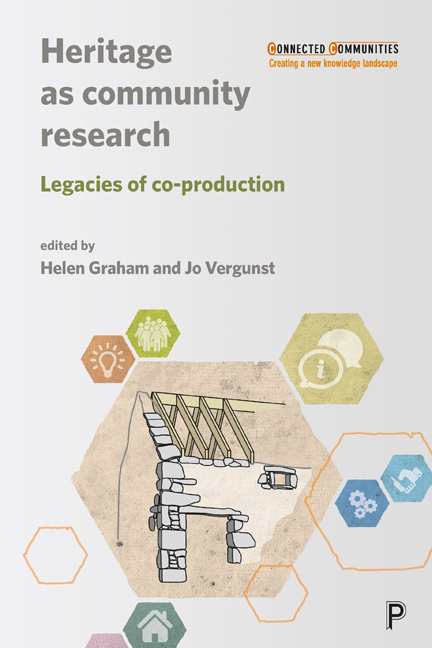Part Two - Heritage as action
Published online by Cambridge University Press: 27 April 2022
Summary
‘Heritage as action’ groups together our final four chapters. Each chapter is explicitly concerned with action itself as a form of research practice that enables both understanding of the past and change in the present. Thinking of research in this way draws on a well-established tradition of action and of participatory research, where cycles of action and reflection enable knowledge. Underpinning action research is the epistemic commitment that we are always in the middle of things and there is no objective or unentangled place for research. Instead, you need to start from ‘where you are’ and to ‘dig where you stand’ (Lindqvist, 1979).
In Chapter Six, Oliver Davis, Dave Horton, Helen McCarthy and Dave Wyatt explore, through different perspectives, the role that shared archaeology and heritage work play in the Caerau and Ely Rediscovering Heritage Project (CAER). Through enabling people to contribute in different ways, and to different intensities, it has sought to hold the production of archaeological knowledge and social and political change in dynamic relationship.
In Chapter Seven, Karen Brookfield, Danny Callaghan and Helen Graham, with members of the Ceramic City Stories team (Jayne Fair, Jan Roberts and Phil Rowley), elaborate the idea of ‘DIY heritage’ based on their work in the Potteries. They do so through exploring a specific event and how it worked to create moments of connection – what the group call the ‘Stoke Ping’. The authors draw on wider DIY traditions ‘to describe an ethos of horizontal community action, of mutual aid and of making alternatives now’. The chapter argues that DIY approaches challenge models of exponential growth that often exist in funding, policy and activism, and instead favour the magic of small moments and connections. Yet, they also show – through a recent innovative Heritage Lottery Fund initiative – how funding can be deployed to enable rather that constrain DIY horizontal, small-scale and action-led approaches.
In Chapter Eight, Kimberley Marwood, Esme Cleall, Vicky Crewe, David Forrest, Toby Pillatt, Gemma Thorpe and Robert Johnston develop a concept of ‘action heritage’ to show how ‘the practices and processes of researching are transformative in themselves’. Through telling a variety of stories about their community heritage programme, they suggest that working together to produce understanding of the past has ‘social and cultural impact around themes of cohesion, participation, social justice, community voice and identity’.
- Type
- Chapter
- Information
- Heritage as Community ResearchLegacies of Co-production, pp. 127 - 128Publisher: Bristol University PressPrint publication year: 2019



